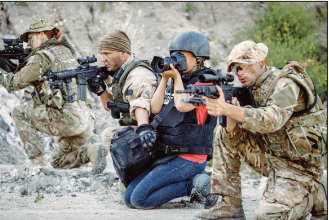NO PLACE FOR A WOMAN
In August 1939, Clare Hollingworth, a 28-year-old aid worker, had been employed as a reporter for less than a week by the Daily Telegraph when she landed her first serious journalistic coup. Using .......................... and diplomatic skills, she convinced a friend in the Foreign Office to lend her his chauffeured car. Stocking up with supplies in soon to be .......................... Poland, and .......................... the border guards, she crossed into Germany with nothing but her .......................... and her smarts, the most important of a reporter’s tools. She didn’t disappoint her editors. Her first story was a .......................... : “1,000 tanks .......................... on Polish border”. The story described battalions ready to be deployed at a .......................... . In fact, it was Hollingworth’s .......................... with German tanks massed on the Polish border that effectively informed the world that World War II had begun. It was literally the story of the century, and it was crucially a woman, and not a man, who had reported it. Hurriedly, she filed her copy and .......................... back to Poland, spending the next few weeks as an eyewitness to the start of the war. She carried her typewriter with her everywhere. Over the decades, she stayed close to the action, covering Algeria, Vietnam, China’s Cultural Revolution, and the .......................... of Kim Philby, Britain’s most .......................... cold war .......................... , and she interviewed the Shah of Iran. She was always, in the words of John Simpson, her BBC colleague, ‘in the right place at the right time’. However, she insists she was not an .......................... . It was more about ‘playing a slightly uncertain game... unsure of which way it would go’. She liked ‘being in a plane about to bomb something, or being on the ground in the desert when an army was advancing’. Female war reporters find it hard to settle into .......................... , and Hollingworth was no exception. She married twice, but had no children of her own. Instead, journalism remained her life. It was the fuel that kept her speeding ahead; one imagines she would have died of boredom being a banker’s wife in Notting Hill. Nevertheless, she doubtless endured the heartbreak which comes with being a woman trying to make a living outside of tradition, a .......................... which is as true today as it was 70 years ago. Hollingworth, now aged 105, has been a resident of Hong Kong for many years. She is “inordinately proud to be British; though, so much had changed since the glory days”. Despite her age, she still apparently keeps her shoes and a packed travel bag by her bedside, ready to spring into action if she has to leave on assignment in a hurry. (Reading text adapted from the Spectator)

